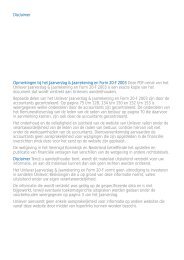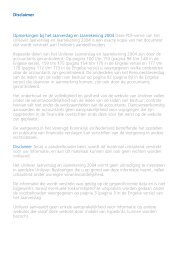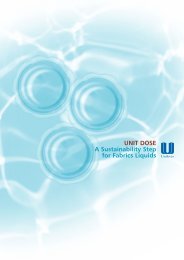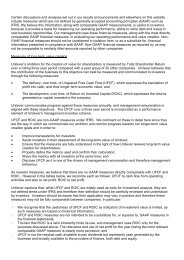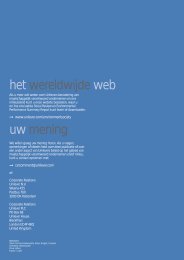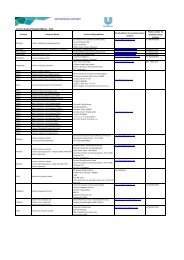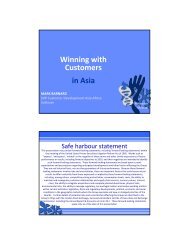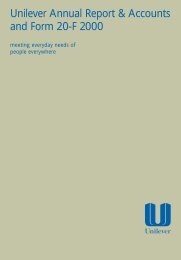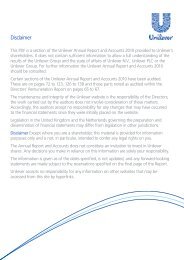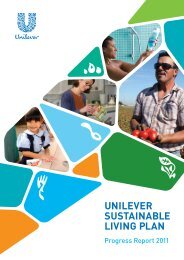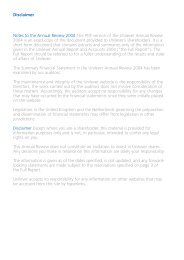Meeting everyday needs of people everywhere - Unilever
Meeting everyday needs of people everywhere - Unilever
Meeting everyday needs of people everywhere - Unilever
You also want an ePaper? Increase the reach of your titles
YUMPU automatically turns print PDFs into web optimized ePapers that Google loves.
63 <strong>Unilever</strong> Annual Report on Form 20-F 1999 Financial Statements<br />
<strong>Unilever</strong> Group Accounting information and policies<br />
The Group has decided not to adopt the fair value<br />
provisions <strong>of</strong> SFAS 123 ‘Accounting for Stock-Based<br />
Compensation’. The disclosure requirements <strong>of</strong> this<br />
standard are given in note 33 on pages 94 to 102.<br />
SFAS 133 ‘Accounting for Derivative Instruments and<br />
Hedging Activities’ as amended by SFAS 137 is effective<br />
for fiscal years beginning after 15 June 2000. The<br />
statement requires that an entity recognise all derivatives<br />
as either assets or liabilities in the statement <strong>of</strong> financial<br />
position and measure those instruments at fair value.<br />
It is not possible to quantify the impact <strong>of</strong> this standard<br />
on <strong>Unilever</strong>’s financial position or results <strong>of</strong> operations<br />
in advance.<br />
SOP 98-1 ‘Accounting for the Costs <strong>of</strong> Computer<br />
S<strong>of</strong>tware Developed and Obtained for Internal Use’ is<br />
effective for fiscal years beginning after 15 December<br />
1998. The SOP provides authoritative guidance on<br />
accounting for the costs <strong>of</strong> computer s<strong>of</strong>tware developed<br />
or obtained for internal use and requires costs incurred in<br />
the application development stage to be capitalised and<br />
amortised over their expected useful lives. The adoption <strong>of</strong><br />
SOP 98-1 did not have a material effect on <strong>Unilever</strong>’s<br />
financial position or results <strong>of</strong> operations.<br />
SOP 98-5 ‘Reporting on the costs <strong>of</strong> start up activities’,<br />
requires that costs for start up activities and organisation<br />
costs be expensed as incurred and is applicable to all<br />
financial statements for fiscal years beginning after<br />
15 December 1998. The adoption <strong>of</strong> SOP 98-5 did not<br />
have a material effect on <strong>Unilever</strong>’s financial position or<br />
results <strong>of</strong> operations.<br />
Group companies<br />
Group companies are those companies in whose share<br />
capital NV or PLC holds an interest directly or indirectly,<br />
and whose consolidation is required for the accounts to<br />
give a true and fair view.<br />
In order that the consolidated accounts should present<br />
a true and fair view, it is necessary to differ from the<br />
presentational requirements <strong>of</strong> the United Kingdom<br />
Companies Act 1985 by including amounts attributable<br />
to both NV and PLC shareholders in the capital and<br />
reserves shown in the balance sheet. The Companies Act<br />
would require presentation <strong>of</strong> the capital and reserves<br />
attributable to NV and PLC shareholders as minority<br />
interests in the respective consolidated accounts <strong>of</strong> NV<br />
and PLC. This presentation would not give a true and<br />
fair view <strong>of</strong> the effect <strong>of</strong> the Equalisation Agreement,<br />
under which the position <strong>of</strong> all shareholders is as nearly<br />
as possible the same as if they held shares in a<br />
single company.<br />
Net pr<strong>of</strong>it and pr<strong>of</strong>it <strong>of</strong> the year retained are presented<br />
on a combined basis on page 66, with the net pr<strong>of</strong>it<br />
attributable to NV and PLC shareholders shown separately.<br />
Movements in pr<strong>of</strong>it retained are analysed between those<br />
attributable to NV and PLC shareholders in note 21 on<br />
page 84.<br />
Foreign currencies<br />
Exchange differences arising in the accounts <strong>of</strong> individual<br />
companies are dealt with in their respective pr<strong>of</strong>it and loss<br />
accounts. Those arising on trading transactions are taken<br />
to operating pr<strong>of</strong>it; those arising on cash, current<br />
investments and borrowings are classified as interest.<br />
In preparing the consolidated accounts, the pr<strong>of</strong>it and loss<br />
account, the cash flow statement and all movements in<br />
assets and liabilities are translated at annual average rates<br />
<strong>of</strong> exchange. The balance sheet, other than the ordinary<br />
share capital <strong>of</strong> NV and PLC, is translated at year-end rates<br />
<strong>of</strong> exchange. In the case <strong>of</strong> hyper-inflationary economies,<br />
the accounts are adjusted to remove the influences <strong>of</strong><br />
inflation before being translated.<br />
The ordinary share capital <strong>of</strong> NV and PLC is translated at<br />
the rate <strong>of</strong> £1 = Fl.12 contained in the Equalisation<br />
Agreement. The difference between this and the value<br />
derived by applying the year-end rate <strong>of</strong> exchange is taken<br />
to other reserves (see note 22 on page 84).<br />
The effects <strong>of</strong> exchange rate changes during the year on<br />
net assets at the beginning <strong>of</strong> the year are recorded as a<br />
movement in pr<strong>of</strong>it retained, as is the difference between<br />
pr<strong>of</strong>it <strong>of</strong> the year retained at average rates <strong>of</strong> exchange<br />
and at year-end rates <strong>of</strong> exchange.<br />
Goodwill and intangible assets<br />
No value is attributable to internally generated intangible<br />
assets. Goodwill (being the difference between the<br />
consideration paid for new interests in group companies,<br />
joint ventures and associated companies and the fair value<br />
<strong>of</strong> the Group’s share <strong>of</strong> their net assets at the date <strong>of</strong><br />
acquisition) and identifiable intangible assets purchased<br />
after 1 January 1998 are capitalised and amortised in<br />
operating pr<strong>of</strong>it over the period <strong>of</strong> their expected useful<br />
life, up to a maximum <strong>of</strong> 20 years. Periods in excess <strong>of</strong><br />
five years are used only where the directors are satisfied<br />
that the life <strong>of</strong> these assets will clearly exceed that period.<br />
Goodwill and intangible assets purchased prior to<br />
1 January 1998 were written <strong>of</strong>f in the year <strong>of</strong> acquisition<br />
as a movement in pr<strong>of</strong>its retained.



